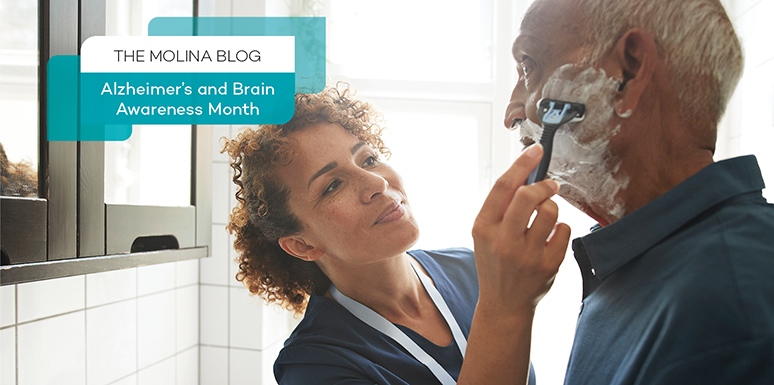June 30, 2023 / Molina Healthcare

June is Alzheimer’s and Brain Awareness Month. It is a great time to learn what Alzheimer’s disease is and how it affects the brain.
Many families don’t know what Alzheimer’s disease is until it hits close to home. Having knowledge of the disease can help you provide better care for someone with the disease.
What is Alzheimer’s disease?
Alzheimer’s disease is a type of dementia. It affects an individual’s memory, thinking and behavior. Symptoms can interfere with daily tasks.
The disease affects everyone differently. To get an idea of how abilities change over the course of Alzheimer’s disease, use the following seven stages as a reference.
Stage 1: No impairment
At this stage, the individual will not experience memory problems. None are visible to a health care professional.
Stage 2: Very mild cognitive decline
The individual may begin to have memory lapses. Forgetting people’s names and or where they left their keys will happen more frequently.
Stage 3: Mild cognitive decline
Noticeable changes occur at this stage. The individual may experience problems in memory and concentration.
Some examples include:
Stage 4: Moderate cognitive decline
At this stage, a careful medical interview will help detect symptoms in several areas:
Stage 5: Moderately severe cognitive decline
Individuals in stage 5, may need help completing their everyday tasks. They may be:
They can still remember important details about themselves and their family and will not need assistance with eating or using the restroom.
Stage 6: Severe cognitive decline
At stage 6, an individual’s memory will continue to worsen. Changes in personality and behavior will also take place. Individuals can’t recall their children, spouse or caregiver’s name. They may also begin to wander, have difficulty sleeping and might experience hallucinations.
Stage 7: Very severe cognitive decline
At the final stage of the disease, the individual will experience a loss of motor skills. They will lose the ability to speak. The brain and body lose their connection. Loved ones and caregivers will need to help the individual with walking, eating and using the restroom.
If you notice that someone close to you is displaying these symptoms, contact their doctor.
Asking for help
Remember that medicine can only control the symptoms of Alzheimer’s. It does not cure Alzheimer’s. Taking care of an individual with Alzheimer’s is rewarding but can become tiring. Asking for help is okay. When you ask for help you acknowledge your limits.
Sources:
https://www.molinahealthcare.com/providers/ca/medicaid/resource/Health-Resources.aspx
https://www.pennmedicine.org/updates/blogs/neuroscience-blog/2019/november/stages-of-alzheimers
https://www.nia.nih.gov/health/getting-help-alzheimers-caregiving
https://www.cedars-sinai.org/health-library/diseases-and-conditions/a/alzheimers-disease.html
https://act.alz.org/site/DocServer/sevenstages.pdf;jsessionid=00000000.app20124b?docID=16881&NONCE_TOKEN=B620F7EDDD58944958CD3C64E5F6E6ED
Category: Disease / Mental Health